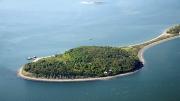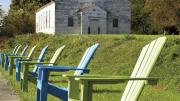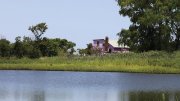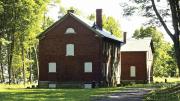Skip the clogged commute to the Cape and start your vacation right now by riding the ferry to Peddocks Island in Boston. At 184 acres, Peddocks is the largest of the Harbor Islands and offers the most diverse terrain—woodlands, fields, and beaches—along with perfect views of the sun, both rising and setting, and the Boston skyline. “It’s big enough so you can lose yourself for a day,” notes Mike Dyer, vice president of development and external affairs at the Boston Harbor Alliance, “but has enough mystery to captivate you for the weekend.”
Where Georges Island’s Civil War-era Fort Warren attracts umpteen visiting school children a year and Spectacle Island’s Cinderella tale proves that landfills can become stunning urban parks, Peddocks, alone, offers yurt camping. Stay in one of the luxurious canvas-sided yurts just built this year, or go more rustic at a traditional tent site. Then spend the rest of the time exploring the island’s own military history, its summer-cottage colony, or go bird-watching, hiking, fishing, or swimming at sandy Petty Cove.
The island is divided by hills, or headlands: East, Middle, and West. The ferry docks at East Head, where the camping is located, and where visitors can walk among the remaining World War I-era brick buildings of Fort Andrews, including the newly renovated chapel (now open for public and private events), and learn some island history. Native Americans used Peddocks, says Dyer, before European farmers arrived in 1634. By 1776, more than 600 militiamen were stationed there to guard against British troops; the fort itself was active from 1904 through the end of World War II.
Hiking trails run throughout the island. The quarter-mile loops are good for smaller legs; for tougher types, a 2.5-mile route extends into the uninhabited West End. Hilly, tree-lined trails, rolling grasslands, and native roses and hedgerows abound. It may not be “wilderness,” but as a haven in a major American city, Peddocks gets wondrously close to unspoiled nature. And any time spent there is far more rejuvenating than hours spent sitting in a hot car on Route 3.












